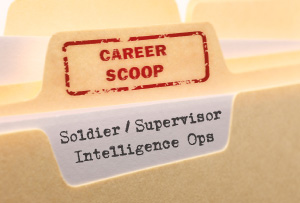Career Insight: Soldier / Supervisor Intelligence Operations, Intelligence Corps
In a nutshell, what do you do?
I collect, analyse and interpret all-source information, to enable Australian Defence Force commanders to make well informed decisions. In short, the main job I perform is to research and then produce reports in various forms- verbal, written, or presentations on a variety of topics- to inform the military decision making process.
Why did you decide to become a Soldier?
Fun, adventure, camaraderie, overseas travel and operational service, working outdoors, having fitness as part of my job, being in the bush regularly, working for the Government in a security role (i.e. not working for a company that makes money)
What path did you take into it?
I joined the Australian Regular Army after 4 and 1/2 years at university (BA politics and Masters International Relations) but this had no bearing on my career. I joined the Army directly as a recruit (Radio Operator) and waited the required time (3 years) to transfer into the intelligence corps.
What, in your opinion, is the best bit of being a Soldier?
Overseas service for the experience – the best work I have ever done (you cannot do it in any other job) and the money is very good
Every job has its downsides. What do you think are the worst bits?
Time spent on continual training serials / exercises and courses – equating to time away from family.
Is it what you expected when you first started out – and what’s different?
Yes to some extent it is what I expected, however the variety of different jobs and roles is far greater than I first thought. The army is not just about being out in the bush carrying a weapon.
What do the public least understand – or mistake – about what you do?
The public has an idea that soldiers are constantly “living army”, on barracks all the time. While this is true for short periods (courses, initial training) we work 730 to 1600 and leave work to live normal lives.
What kind of people tend to do well?
Skills and strengths – People for whom discipline is important (particularly self-discipline), physically and mentally robust, people who like working in teams (real teams-as opposed to what people who work in offices think are teams. You eat, sleep, wash, work and do everything with groups of (usually) guys who you might not otherwise like.
Values – honesty is important and will get you far in the Army, not much else is required.
Personality – you need to be able to “fit in”. That is not to say you cannot be an individual, but you must be able to act as a member of a group much of the time or you will encounter problems. Also you must have thick skin- failure is regular in the Army and you will fail and receive harsh feedback at times. If you can take criticism life will be easier.
Finally, any advice you’d offer to people looking to get into this line of work?
Do it if you like being in close relationships with people – I doubt there is any life like being in the Army (particularly when you start out). It is a great career for young people who do not have families, are prepared to travel, and learn new things (all types of things – I have learnt a language, done parachuting (on land and water), leant how to use more than 10 different weapon systems, received my licence in operating heavy trucks, operated numerous communications systems, fast roped from helicopters, been taught how to lead/follow/train/mentor (both academically and practically), etc.
I have travelled to East Timor, Afghanistan, the UAE, South Africa, The Philippines, the USA and every state and territory in Australia (except Tasmania). I have lived in Melbourne, Sydney, Brisbane and Canberra which has all been facilitated by the Army; if you are prepared to move about and travel there is no life like it – BUT after 10 years the continual movement is hard.




